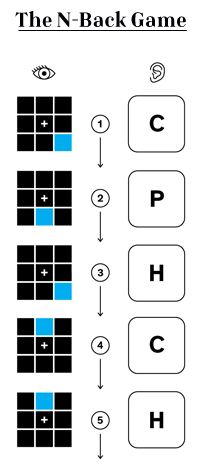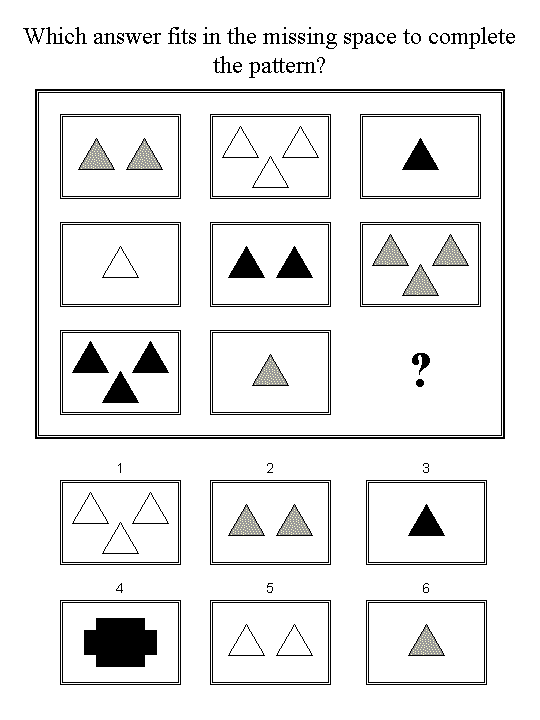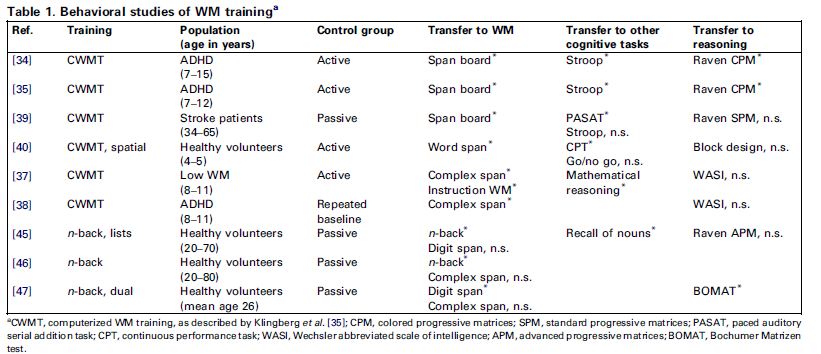I think the article is a bit--but only a bit--too optimistic in its presentation.
The article correctly points out that a number of labs have replicated the basic finding: training with one or another working memory task leads to increases in standard measures of fluid intelligence, most notably, Raven's Progressive Matrices.

That is the training task that you are to practice. (And although the figure calls it a "game" it's missing one usual feature of a game; it's no fun at all.)
There are two categories of outcome measures taken after training. In a near-transfer task, subjects are given some other measure of working memory
to see if their capacity has increased. In a far-transfer task, a task is administered that isn't itself a test of working memory, but of a process that we think depends on working memory capacity.
All the excitement has been about far-transfer measures, namely that this training boosts intelligence, about which more in a moment. But it's actually pretty surprising and interesting that labs are reporting near-transfer. That's a novel finding, and contradicts a lot of work that's come before, showing that working memory training tends to benefit only the particular working memory task used during training, and doesn't even transfer to other working memory tasks.
The far-transfer claim has been that the working memory training boosts fluid intelligence. Fluid intelligence is one's ability to reason, see patterns, and think logically, independent of specific experience. Crystallized intelligence, in contrast, is stuff that you know, knowledge that comes from prior experience. You can see why working memory capacity might lead to more fluid intelligence--you've got a greater workspace in which to manipulate ideas.
A standard measure of fluid intelligence is the Ravens Progressive Matrices task, in which you see a pattern of figures, and you are to say which of a several choices would complete the pattern, as shown below.
I'd say the jury is still out.
The Times quotes Randy Engle--a highly regarded working memory researcher--on the subject, and he can hardly conceal his scorn: “May I remind you of ‘cold fusion’?”
Engle--who is not one of those scientists who has made a career out of criticizing others--has a lengthy review of the working memory training literature which you can read here.
Another recent review (which was invited for the journal Brain & Cognition) concluded "Sparse evidence coupled with lack of scientific rigor, however, leaves claims concerning the impact and duration of such brain training largely unsubstantiated. On the other hand, at least some scientific findings seem to support the effectiveness and sustainability of training for higher brain functions such as attention and working memory."
My own take is pretty close to that conclusion.
There are enough replications of this basic effect that it seems probable that something is going on. The most telling criticism of this literature is that the outcome measure is often a single task.
You can't use a single task like the Ravens and then declare that fluid intelligence has increased because NO task is a pure measure of fluid intelligence. There are always going to be other factors that contribute to task performance.
The best measure of an abstract construct like "fluid intelligence" is one that uses several measures of what look to be quite different tasks, but which you have reason to think all call on fluid intelligence. Then you use statistical methods to look for shared variance among the tasks.
So what we'd really like to see is better performance after working memory training on a few tasks.
The fact is that in many of these studies, researchers have tried to show transfer to more than one task, and the training transfers to one, but not the other.
Here's a table from a 2010 review by Torkel Klingberg showing this pattern. (Click the image to see a larger version.)
My guess is that the truth lies somewhere between these two--there's something here, but less than many people are hoping. But it's too early to say with much confidence.


 RSS Feed
RSS Feed